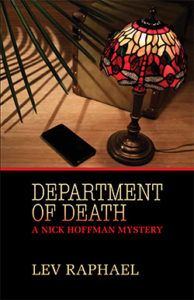I never set out to write mysteries, queer or otherwise. When I launched my career as an author, it was with short stories which were ultimately collected in a book that won a Lambda Literary Award.
But one of them, “Remind Me to Smile,” featured a couple of academics faced with a bizarre situation: Stefan has secured an ex-lover a job in the English department where he’s the writer-in-residence. His partner Nick is outraged and then a bit crazed when Stefan invites the ex to dinner. It was comic but also focused on the struggles of being a couple years before marriage equality changed the landscape.
My first editor at St. Martin’s Press was very taken by the story, only he said the dinner guest should have been poisoned (!). And then a few years later, when I was wondering where I should take my career after a collection of short stories, a novel, and a study of Edith Wharton, my editor said “Nick and Stefan could be like Nick and Nora Charles.”
That’s when the Nick Hoffman series was born. He and Stefan teach at the same university and happy together, but the unexpected keeps intruding into their lives thanks to the murderous academics they work with. I’ve continued writing it over the years because I loved the characters and because I loved the academic setting where, as Borges put it so well, you find bald men arguing over a comb.
I was already a fan of mysteries before I started; I grew up in a household filled with Agatha Christie books; and I was reviewing mysteries and thrillers for the Detroit Free Press. That made me determined to avoid one thing: sleuths who don’t get changed by what happens to them. In far too much crime fiction, the protagonist discovers a body and then goes off for breakfast at Denny’s as if nothing’s happened.
Nick ages and is definitely changed by the deaths he encounters. His relationship with Stefan develops, too. Depicting a loving queer couple over time and under stress has been one of the joys of this series. The world has changed a lot, too, since the series began in the 90s, so it’s been fun to chart those changes in mysteries, which are good vehicles for social commentary.
Mystery writing has made me a better teacher, too, and I’ve been fortunate to teach mystery fiction in classes, workshops, and online. The series has more impact than I would have guessed, putting me on the map in ways I never could have imagined. The New York Times Book Review took notice, especially relishing the academic milieu. That’s how a writing career goes: the unexpected is always your companion. And of course, the unexpected keeps happening to Nick and Stefan living in a bucolic college town that has a dark side. Through all of it, however, their bond is never shaken.
Lev Raphael’s latest mystery is Department of Death, which Publishers Weekly called “immensely enjoyable.” He mentors writers, edits manuscripts, and teaches writing workshops online at writewithoutborders.com.
(fingerprint image by Kurious at Pixabay)



